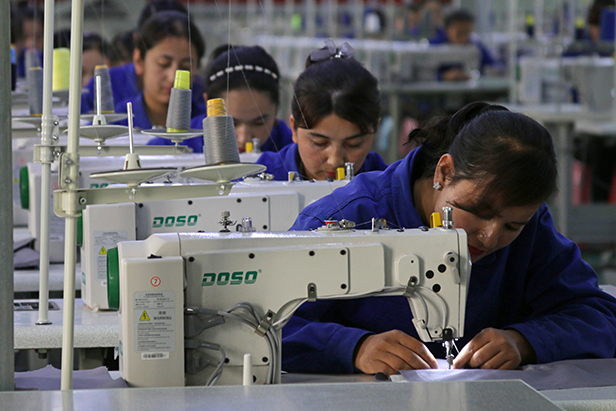News November 19, 2019
Sourcing Watch: Forced Labor Reports in Xinjiang, China
U.S. officials are calling for sanctions. Supply chains, including those of promo product companies, could be affected by fallout from the controversy.
Renewed allegations of forced labor and internment in China’s Xinjiang Uyghur Autonomous Region (XUAR) have led U.S. lawmakers to call for sanctions and more action from U.S. Customs and Border Protection officials.
The controversy has implications for any company – including those in the promotional products industry – that’s sourcing apparel and other products from XUAR factories, which are linked to the alleged use of forced labor by a mounting body of evidence. In fact, there could be broader implications, as lawmakers noted that prominent Chinese (and Hong Kong-based) companies not in XUAR may manufacture their products with materials and components produced in Xinjiang.

Uyghur women work in a cloth factory in Xinjiang province, China.
The latest outcry over XUAR erupted following a Nov. 16th report in The New York Times that exposed the Chinese government’s alleged crackdown on as many as a million ethnic Uyghurs, Kazakhs and others of predominantly Islamic faith in Xinjiang. Citing evidence from 403 pages of leaked Chinese government documents, the Times report indicated that Beijing has placed members of these ethnic groups in internment camps and prisons, and used them as forced labor in XUAR-based factories. Goods produced through the slave labor reportedly include apparel.
China has detained up to a million Muslims, a campaign it calls a benevolent and routine effort against the pull of extremism. But 403 pages of Communist Party documents we obtained reveal how officials plotted to carry out a ruthless, coercive clampdown. https://t.co/s6Sa2GenA3
— The New York Times (@nytimes) November 16, 2019
About a year ago, ad specialty industry apparel supplier Badger Sportswear (asi/37876) became a focus in the human rights story after an Associated Press investigation linked the North Carolina-based firm to an apparel manufacturer in Xinjiang that was allegedly using forced labor.
After the AP’s report made global headlines last December, Badger Sportswear suspended ordering, receiving and shipping any product from the manufacturer, Heitain Taida Apparel Co., Ltd. In January, Badger formally severed its connection with the factory. At the time, however, the suspension didn’t stop some Badger clients, including colleges and universities, from breaking off business with the supplier.
The Badger scenario is a cautionary tale for other companies whose supply chains in any way touch XUAR, perhaps even more so now that U.S. lawmakers are turning sharper eyes on China’s reported repression tactics in the region.
For instance, U.S. Rep. James McGovern and Sen. Marco Rubio have sent U.S. Customs and Border Protections’ Acting Commissioner Mark Morgan a letter calling for his department to investigate – and block the importing of – apparel and other goods made with forced labor in Xinjiang, which is in northwestern China.
The chair and co-chair of the bipartisan Congressional-Executive Commission on China (CECC), McGovern and Rubio said that “there is substantial risk that apparel made in XUAR, or with XUAR components, is made with forced labor. The risk of forced labor is so great that it is difficult, if not impossible, for companies to conduct appropriate due diligence of their supply chains in the regions. In addition, evidence suggests that if a factory in the XUAR employs forced labor, the entire corporate group that controls the factory is likely affected by forced labor.”
To the politicians’ latter point: Xinjiang reportedly produces 80% of China’s cotton. That means, potentially, that supply chains that use Chinese cotton in their products could be tied to forced labor. The Wall Street Journal has reported that brands that include H&M, Adidas and Uniqlo have products that contain Xinjiang cotton.
In light of the Times report, the CECC called for U.S. and international sanctions. “Congress should pass legislation to address what are truly egregious abuses,” the CECC said in a tweet.
The #XinjiangPapers confirm what was long known, a ruthless campaign carried out by high level officials who should face, at very least, U.S. & int’l sanctions, including #Politburo member #ChenQuanguo. Congress should pass legislation to address what are truly egregious abuses. https://t.co/9Vws6FyGan
— China Commission (@CECCgov) November 18, 2019
As concern over Xinjiang increases, members of Congress have also urged the implementation of the Uyghur Human Rights Policy Act. Beyond appointing a State Department coordinator on Xinjiang, the legislation would mandate frequently updated reports on China’s Xinjiang camps, among other things. While the Senate has passed the Uyghur Rights Act, it remains under debate in the House of Representatives.
Meanwhile, American lawmakers are also asking that sanctions, under the Global Magnitsky Act, be imposed on XUAR Party Secretary Chen Quanguo and other Chinese officials, who are believed to be leading the repression of Muslim minorities in XUAR.
